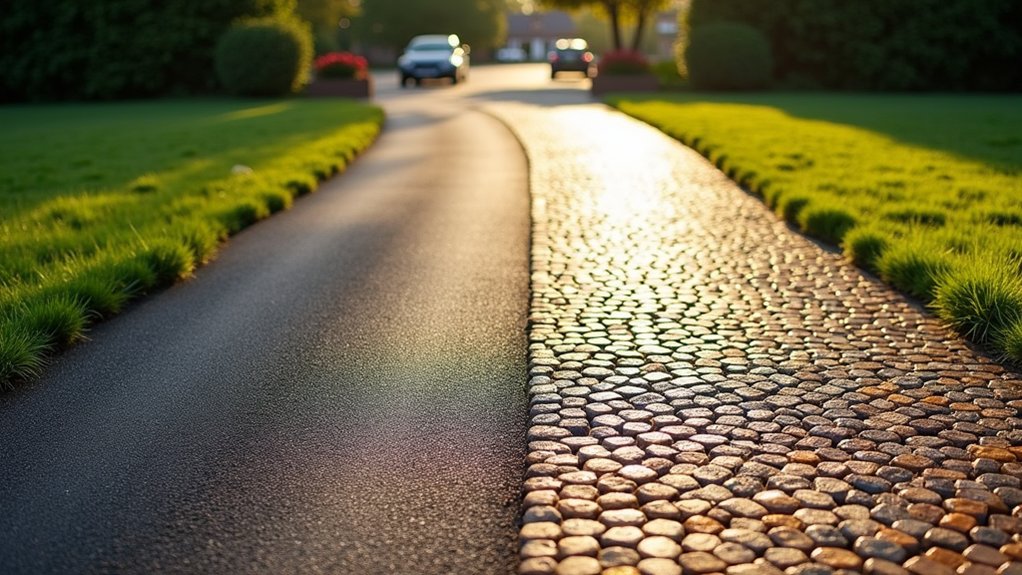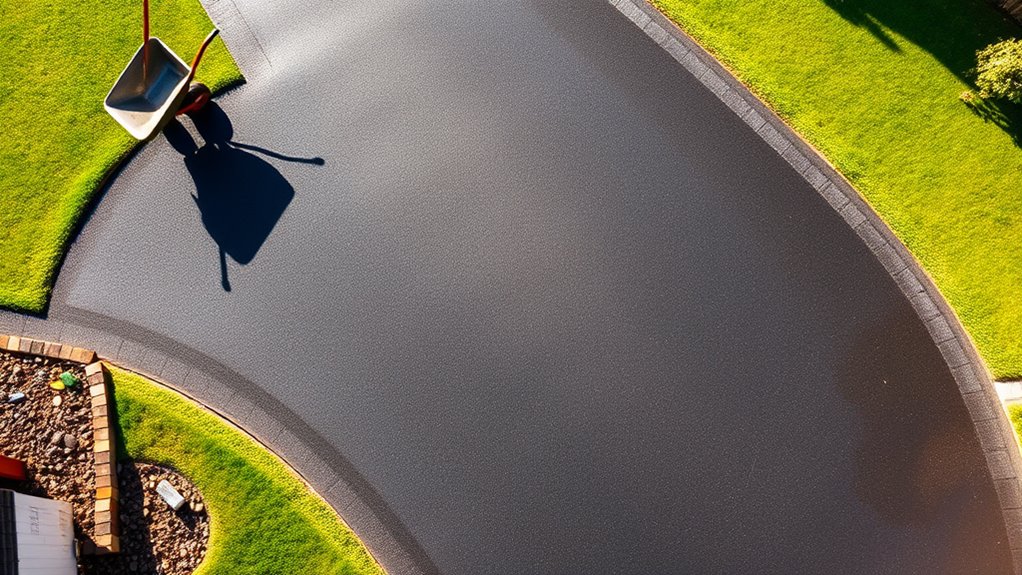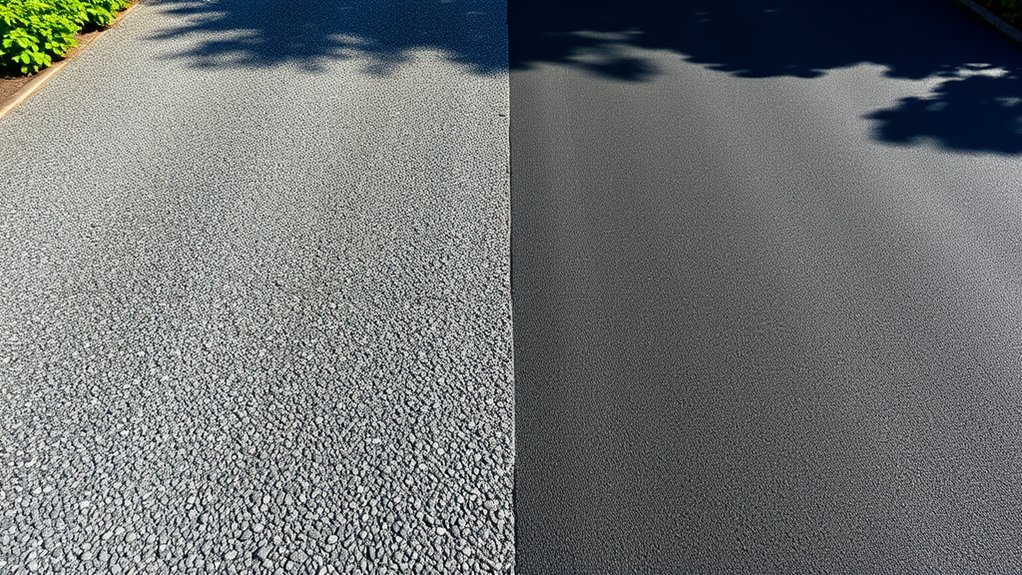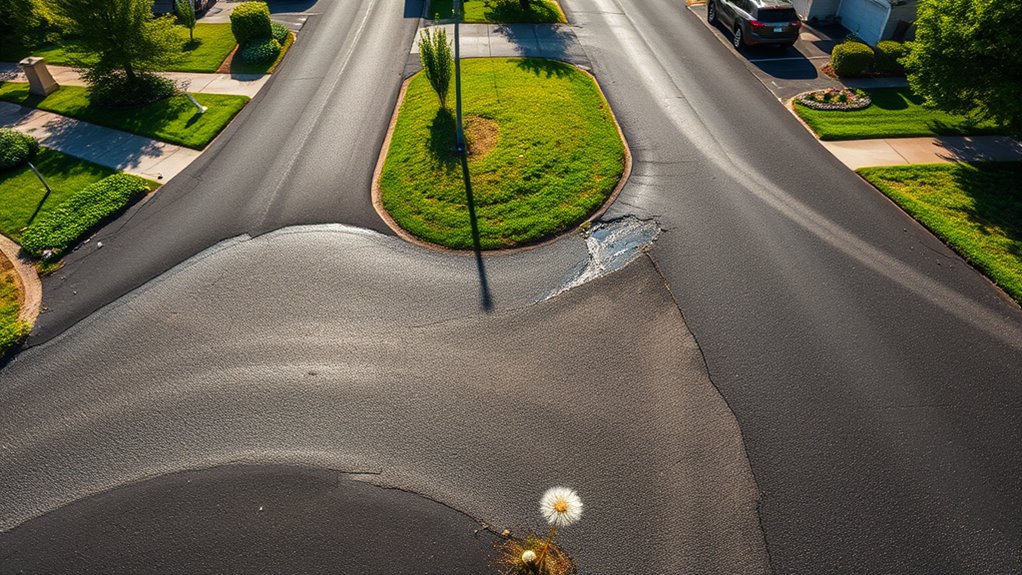When comparing tarmac and resin driveways, tarmac generally costs around £90 per square metre for installation, making it a more budget-friendly choice upfront. However, resin driveways, though more expensive initially, provide better long-term durability and visual appeal.
Tarmac requires regular maintenance and resurfacing, which can add up over time. In contrast, resin surfaces need less frequent upkeep and tend to last longer. By considering these cost differences, you can decide which driveway option aligns best with your needs and preferences.
Table of Contents
ToggleKey Takeaways
- Tarmac installation costs around £90 per square metre, making it a more budget-friendly option compared to resin driveways, which generally have higher initial costs.
- However, tarmac requires regular sealcoating and repairs, which can lead to long-term maintenance costs that may match or exceed the upfront expenses of resin.
- Tarmac typically lasts between 15 to 25 years, while resin driveways have a lifespan of 15 to 20 years but may need resurfacing more often, especially with heavy traffic.
- On the aesthetic front, resin driveways offer a wider variety of designs and finishes, which can enhance your property’s value, despite the higher initial outlay.
- Both tarmac and resin need proper drainage, but tarmac often requires more extensive groundwork, which can increase overall installation costs.
Initial Installation Costs
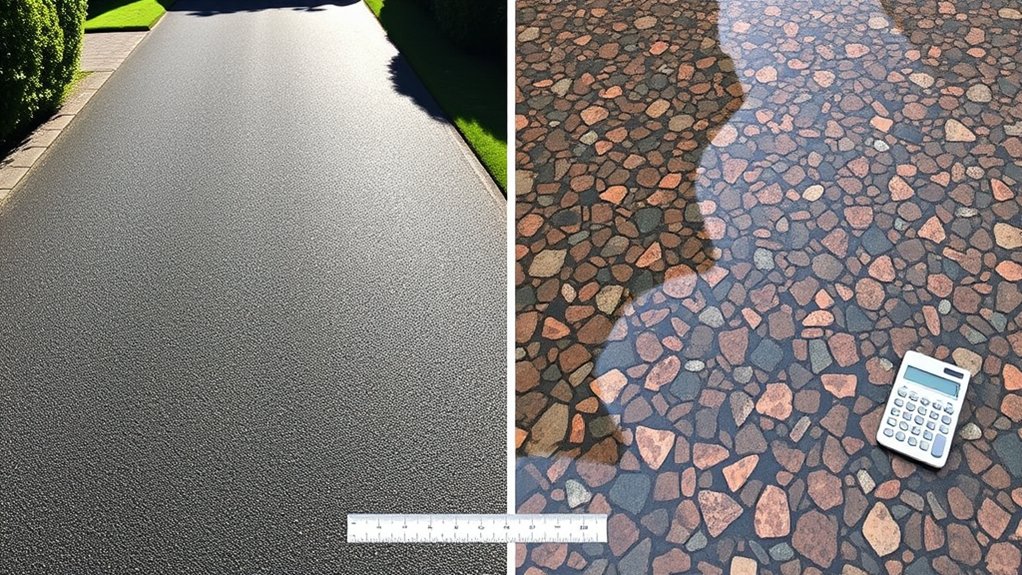
When comparing the initial installation costs of tarmac and resin driveways, tarmac typically proves to be the more affordable option. The material costs for tarmac are generally lower due to its simpler composition and greater availability. Additionally, the labour required for tarmac installation is less expensive, as it demands less specialised skill than resin. For larger driveways, tarmac can significantly lower costs per square metre, averaging around £90 in the UK, although regional variations in labour and material prices may apply. While both options might incur extra costs for features like drainage, tarmac remains the more economical choice for initial installation. This is primarily because tarmac generally cheaper than block paving due to quicker installation. Furthermore, properly installed tarmac driveways can last 20 to 30 years with minimal upkeep, enhancing their long-term value.
Long-Term Costs
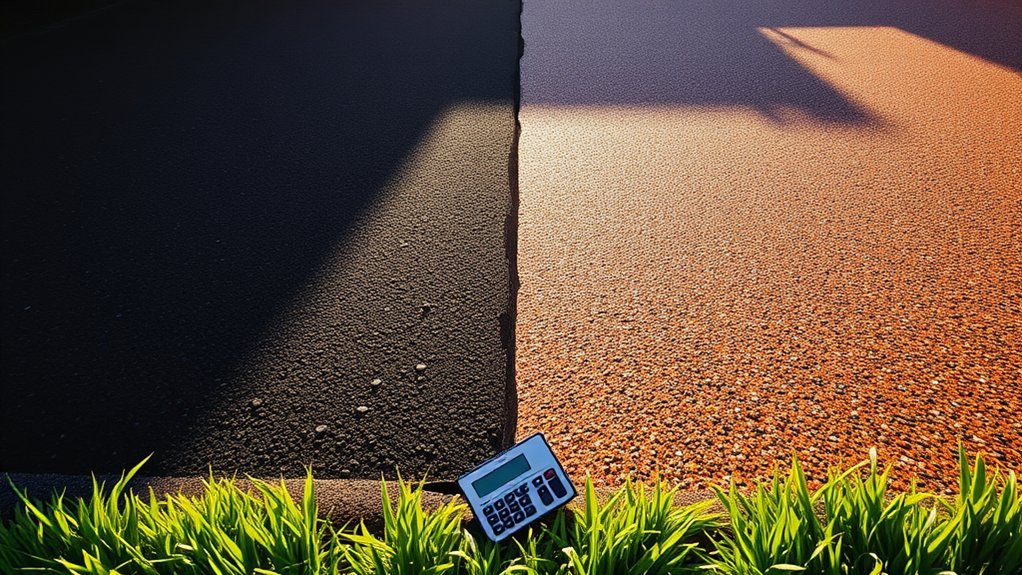
When considering long-term costs, you’ll find notable differences in maintenance between asphalt and resin driveways.
Asphalt requires regular sealcoating and repairs, which can add up quickly. In contrast, resin driveways need less frequent maintenance but may require more specialised care. Resin driveways are known for their durability and minimal upkeep, which can significantly influence your overall cost-effectiveness in the long run. For instance, while asphalt might seem cheaper initially, the ongoing maintenance could make resin a more economical choice over time. Additionally, regular sealing of asphalt driveways is necessary to prolong their life and avoid costly repairs.
Maintenance Frequency Comparison
Both tarmac and resin driveways require regular upkeep to ensure their durability, but they differ in maintenance frequency and costs.
Tarmac driveways generally need sweeping and cleaning every month or with the change of seasons. In contrast, resin driveways should be cleaned every few months to keep algae and dirt at bay.
Here’s a quick overview of their maintenance needs:
- Tarmac requires crack filling every 3 to 5 years and seal coating every few years for added protection. Additionally, regular inspections can help identify potential issues early and maintain aesthetic appeal. Implementing regular maintenance practices can significantly extend the lifespan of tarmac driveways.
- Resin surfaces might need washing more often to keep them looking good, but they usually need fewer structural repairs.
- An annual inspection for both types is advisable to identify minor issues before they escalate.
Knowing these maintenance practices can help you manage costs effectively and avoid hefty repairs in the future.
Resurfacing Needs Assessment
Assessing the resurfacing needs of your driveway is crucial for understanding the long-term costs linked to tarmac and resin options.
Tarmac usually needs resurfacing every 8 to 12 years, costing between £1 and £3 per square foot. On the other hand, resin driveways can last over 12 years, but resurfacing can be significantly more expensive, ranging from £10 to £30 per square foot.
It’s important to use proper resurfacing techniques; poor preparation with tarmac can lead to more frequent repairs.
While the initial cost of tarmac resurfacing is lower, ongoing maintenance can add up, potentially matching the higher upfront costs of resin.
When estimating costs, also consider any underlying issues that may need addressing and the expertise required for resin installation, as these factors can greatly influence your long-term budget.
Longevity Cost Benefits
Understanding the longevity of your driveway material can significantly affect your long-term costs. Both tarmac and resin have distinct advantages in this regard.
- Tarmac can last between 15-25 years with proper maintenance, while resin also typically lasts 15-25 years but requires less upkeep.
- Regular sealcoating for tarmac every 2-3 years increases long-term expenses, whereas resin’s minimal maintenance can lead to lower lifetime costs.
- Weather conditions and heavy vehicle use can greatly impact tarmac’s lifespan, making resin a potentially more durable option in certain climates.
Choosing the right material could save you money in the long run, so consider these factors carefully.
Durability and Lifespan
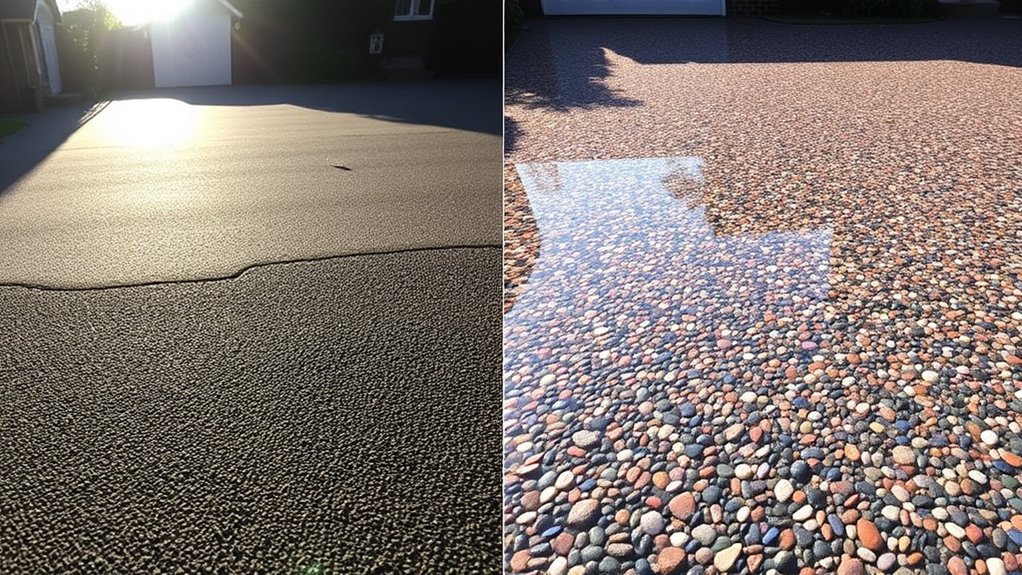
When comparing tarmac and resin driveways, it’s important to consider their durability and lifespan.
Tarmac generally lasts between 15 to 25 years, thanks to its bitumen composition, which allows it to withstand heavy loads and offers flexibility.
On the other hand, resin driveways typically have a lifespan of 15 to 20 years but may wear out more quickly under heavy traffic.
Therefore, your choice should reflect your specific needs and how much traffic your driveway will see.
Lifespan Comparison
When choosing between tarmac and resin driveways, longevity is a key consideration as each material has its own durability. Here’s a quick comparison:
- Tarmac driveways generally last between 15 and 30 years, depending on how well they’re installed and maintained.
- Resin driveways tend to last around 15 to 25 years, but they’re less likely to crack.
Environmental factors, such as weather and sun exposure, can affect the lifespan of both materials.
Resistance to Damage
When considering tarmac and resin driveways, both lifespan and resistance to damage are key factors.
Tarmac is particularly strong against weather conditions; its waterproof bitumen binder protects it from rain, snow, and frost, while also holding up well under heavy traffic, which reduces wear and tear.
On the other hand, resin driveways can be prone to cracking in colder weather, especially if they aren’t sealed properly. This makes damage prevention important with resin.
Tarmac’s flexibility allows it to absorb minor shifts without cracking, making it a robust choice.
While both surfaces need regular inspections, tarmac generally requires less maintenance, which can save you money in the long run.
Aesthetic Appeal
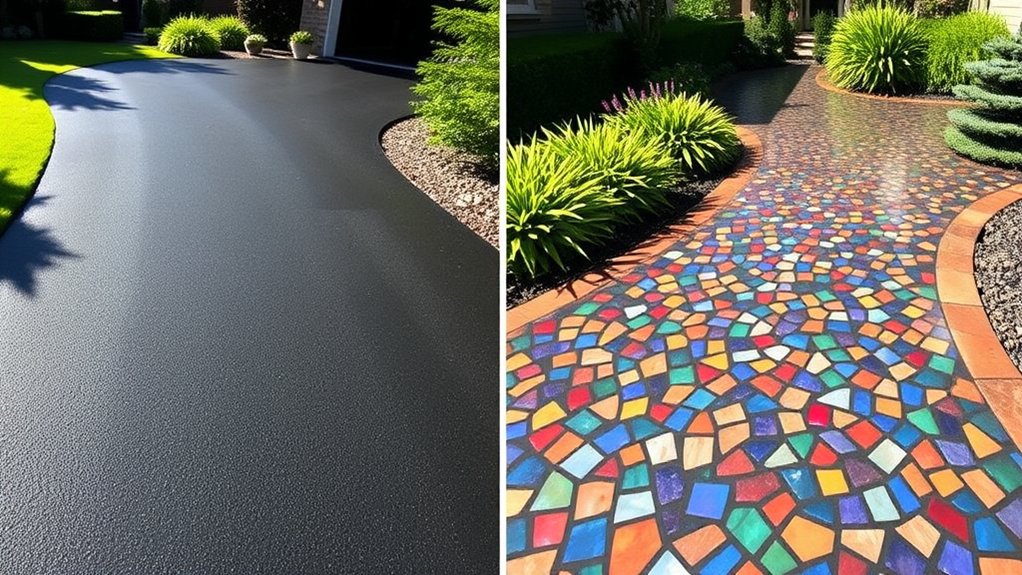
When selecting a driveway, while functionality is important, the aesthetic appeal can significantly influence your property’s overall appearance.
Resin driveways provide a wealth of design options, featuring vibrant colour blends and detailed patterns that enhance visual interest. In comparison, tarmac offers a plain, utilitarian surface with limited decorative choices.
- Resin’s smooth finish and custom designs boost curb appeal.
- Tarmac can look outdated and industrial due to its rough texture.
- Resin surfaces resist fading, maintaining their attractive appearance for longer.
In short, opting for a resin driveway not only complements modern homes but can also enhance your property’s perceived value.
On the other hand, tarmac may restrict your driveway’s visual impact and versatility.
Environmental Benefits
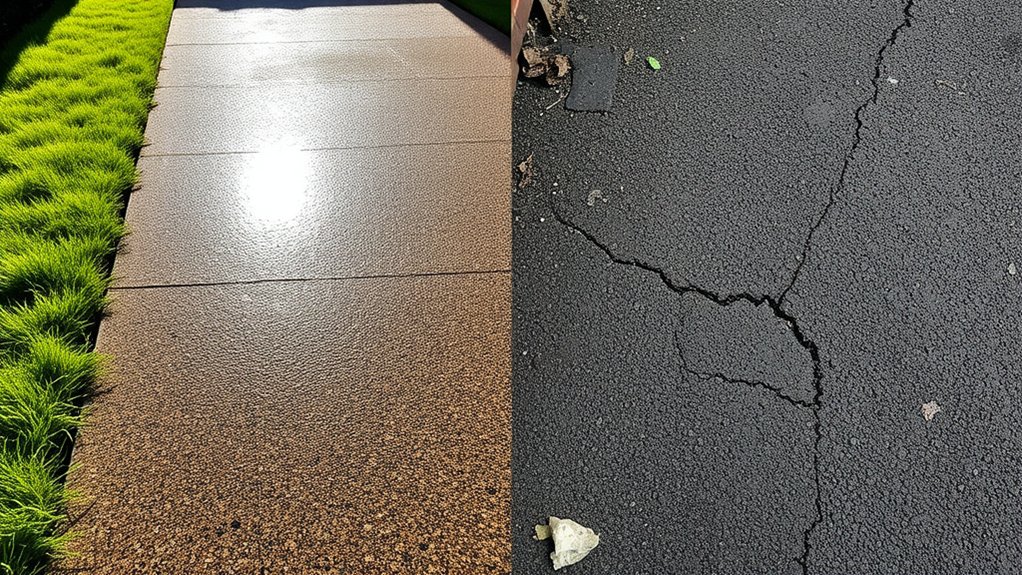
Choosing the right driveway material affects not just your home’s look but also the environment. Tarmac production is energy-heavy, releasing greenhouse gases and using up fossil fuels, which raises its ecological impact.
On the other hand, resin driveways often use recycled materials and are more in line with sustainable practices. Their permeability helps manage surface water, reducing the risk of urban flooding and protecting local streams.
Resin driveways usually last longer and need less maintenance, which means less waste in the long run. While some resin binders can release VOCs, newer formulations are designed to minimise harmful emissions, further reducing their environmental footprint.
Therefore, selecting resin over tarmac can significantly boost your driveway’s sustainability and have a positive impact on the environment.
Installation Time and Complexity
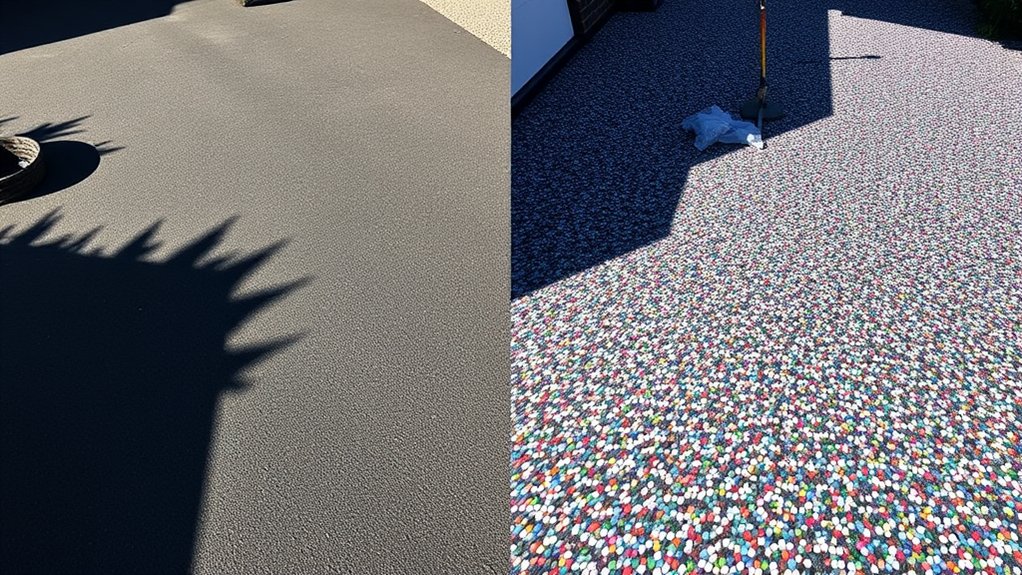
When considering installation time and complexity, it’s important to note the significant differences between tarmac and resin driveways.
Tarmac driveways typically take between 6 to 10 weeks to install, depending on factors like site conditions and weather. On the other hand, resin driveways can often be completed in just 2 to 5 days, although design complexity and surface conditions may impact this timeframe.
- Installing tarmac involves several steps, including base preparation and obtaining any necessary permits.
- Resin driveways, while requiring careful mixing and application, generally have fewer steps involved.
- Both types require proper drainage solutions, but tarmac often demands more extensive work in this area.
Understanding these factors will help you choose the right option based on your needs and circumstances.
Summary of Key Differences
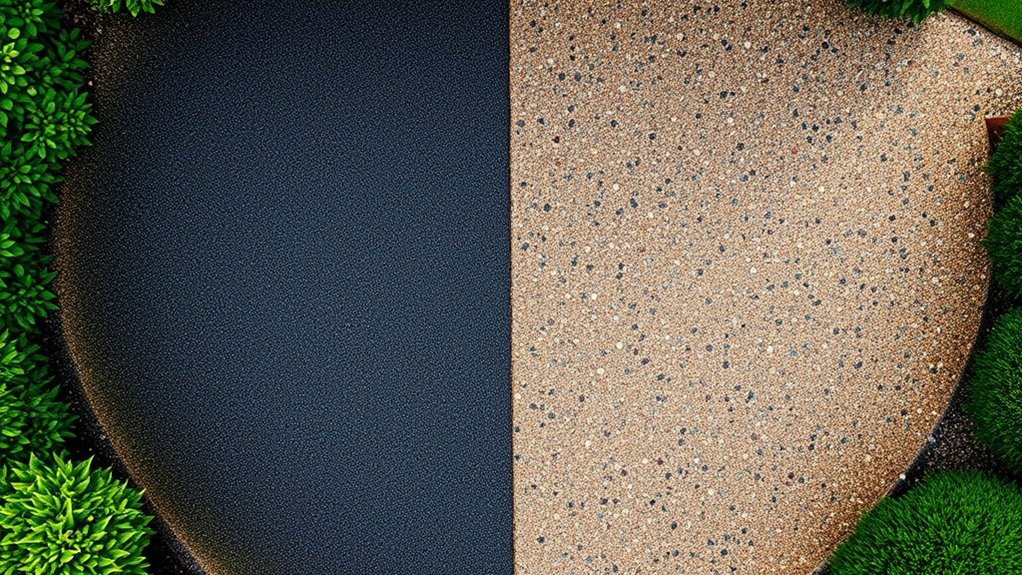
When comparing tarmac and resin driveways, consider key factors such as cost, durability, appearance, maintenance, and environmental impact.
Tarmac is generally cheaper to install but can be sensitive to heat and has a shorter lifespan. Resin, on the other hand, offers greater durability, requires less maintenance, and can last over 20 years.
In terms of appearance, resin provides more design options and retains its colour better, enhancing the overall look of your property. While both materials can support vehicle weight, tarmac may soften in high temperatures.
Ultimately, resin driveways often deliver better long-term value and environmental benefits, making them a more appealing option, even if the initial investment is higher.
Frequently Asked Questions
How Do Weather Conditions Affect Tarmac and Resin Driveways?
Weather conditions significantly affect the durability of driveways. Tarmac is flexible and can better cope with temperature changes, which helps prevent cracks from forming. For instance, during hot weather, tarmac can expand without damage. On the other hand, resin driveways are porous, making them susceptible to pooling and softening in extreme conditions. This means that proper installation and ongoing maintenance are crucial for keeping resin driveways in good condition.
Can I Install a Resin Driveway Over an Existing Surface?
You can install a resin driveway over a stable, well-prepared surface, such as tarmac or concrete. However, it’s crucial to ensure the existing surface is clean and level. Proper preparation is key for a durable and seamless resin installation that will stand the test of time.
Are There Any Warranties for Tarmac or Resin Driveways?
Yes, tarmac driveways usually come with a warranty lasting five years, covering defects. In contrast, resin driveways can have warranties ranging from 10 to 20 years, mainly focusing on the integrity of the surface. It’s important to check the specific terms to ensure you have full coverage and to avoid voiding the warranty.
How Do I Choose Colors for a Resin Driveway?
Choosing colours for your resin driveway means considering popular trends and effective combinations. Think about natural tones for warmth, like earthy browns and soft greys, or go for bold shades to make a statement, such as deep reds or blues. Make sure your choice complements your home’s style and boosts its curb appeal. For example, a light gravel colour can brighten a dark brick house, while a darker shade can create a striking contrast with lighter exteriors.
What Are the Typical Maintenance Tasks for Each Driveway Type?
For tarmac maintenance, regularly sweep, pressure wash, and reseal every few years. For resin driveways, sweep, clean with mild detergents, and check for any damage. Both types require weed control and gentle care to extend their lifespan.
Conclusion
When choosing a driveway, tarmac and resin each have their advantages. Tarmac is the cost-effective option, known for its durability and practicality. It’s a solid choice for those on a budget or looking for a low-maintenance surface. On the other hand, resin driveways are visually appealing and environmentally friendly, offering a range of design options that can enhance your property’s curb appeal.
Consider the installation costs and potential long-term savings. While tarmac may be cheaper upfront, resin might provide better longevity and aesthetic value. Evaluate your priorities, whether it’s cost, appearance, or sustainability, to determine which driveway option is right for you.
How can a tarmac driveway enhance your home's appeal? Discover the key aspects of cost, installation, and maintenance in our Read more
Beneath the surface of tarmac and asphalt driveways lies a world of differences; discover which option suits your needs best.
Uncover the hidden environmental costs of tarmac driveways and explore whether they truly align with sustainable living—what alternatives could be Read more

